Ever wondered about the best protein for chickens? Chickens need a lot of protein to stay healthy, lay plenty of eggs, and grow strong feathers. Protein helps them build muscle, keep warm, and produce those beautiful eggs we all love.
If you want your chickens to live their best lives, it’s important to make sure they’re getting enough protein in their diet. In this list, we’ll go over the 21 of the best protein sources for backyard chickens, so you can keep your flock happy and healthy.
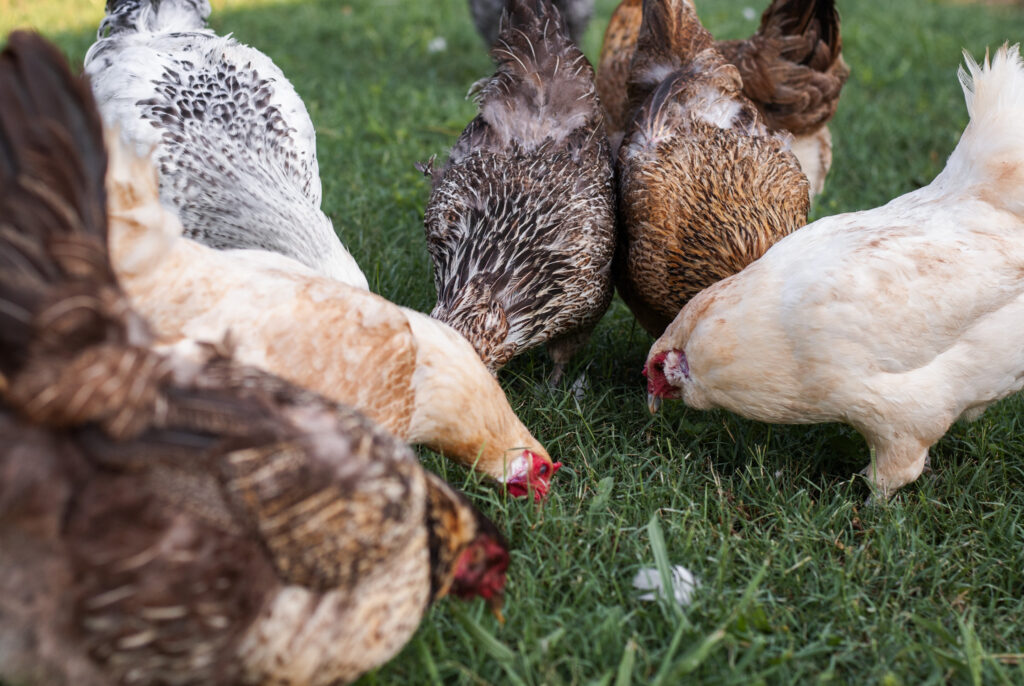
Why do Chickens Need Protein?
Chickens are omnivores and need a good amount of protein because they’re monogastric animals, which means they have just one stomach, unlike ruminants like cows. This makes it harder for them to get all the essential amino acids they need from plants alone, so they benefit from animal-based protein sources.
Amino acids are the building blocks of protein, and they’re super important because they’re what makeup eggs. A laying hen’s protein requirements change depending on where she is in her laying cycle.
For example, when chickens are molting and growing new feathers, they need extra protein to help with that process. So, it’s important to make sure your chickens are getting the right amount of protein at the right times to stay healthy and productive.
My chickens have started molting, so I’ve been giving them extra protein treats to help regrow their feathers. There are many protein sources available, so here’s a look at some of the most popular ones.”
*This post may contain affiliate links which means I make a small commission at no extra cost to you. Read my full disclosure here.*
Best Protein Sources for Chickens
Now that you know why chickens need protein, it’s important to make sure they’re getting enough in their diets. Free-range chickens will naturally search for protein sources like bugs, worms, and small critters while they roam around.
However, if your chickens are kept in a coop, you’ll need to provide alternative protein sources to keep them healthy. Chicken feed is a great way to ensure your flock gets the right amount of protein. Layer feed, designed specifically for egg-laying hens, has the right balance of nutrients, including much protein, to support egg production.
You can also add other protein sources like mealworms, fish meal, or even kitchen scraps like cooked eggs or meat to give them an extra protein boost when needed. Here’s a look at the most popular protein sources for chickens.
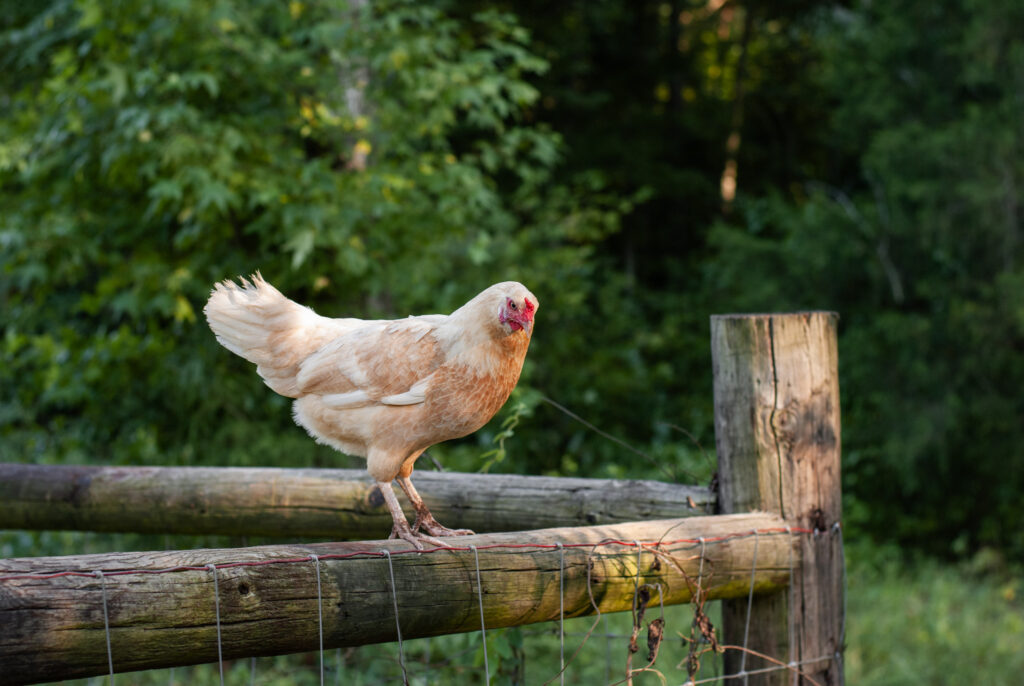
1. Blood Meal
Blood meal is a protein source for chickens that comes from dried blood collected from animal processing plants. The blood is spray-dried at a low temperature, which helps preserve its protein content, making it about 75-90% protein.
While blood meal is mostly used in fish food, it can also be added to poultry diets as a powerful protein boost. Besides its high protein content, blood meal contains important nutrients like calcium and phosphorus, which are essential for strong bones and eggshells.
Chickens don’t tend to like blood meal on its own. If you decide to use it, add a little to their feed or scratch. It’s a great way to ensure your chickens get the nutrients they need to stay healthy and productive.
2. Feather Meal
Feather meal is another protein source for chickens, made from processed poultry feathers. Feathers are packed with keratin, which, when broken down, creates a high crude protein meal that can help meet your chickens’ protein needs.
However, chickens might not love the taste of feather meal. It’s best to mix a small amount in with their regular feed. Remember, this is just a small additive to boost their protein intake, not something that should make up the bulk of their diet.
Too much feather meal can lead to excess protein, which might affect their feed intake and overall health. It’s important to use it in moderation.
3. Fish Meal
Fish meal is another protein source that can be used in chicken diets. It’s typically produced as a byproduct of the fishing industry. While it can cause rapid growth because it has high levels of crude protein, up to 64% if it’s good quality, fish meal isn’t the best choice for chickens long term.
This is because it can contain high levels of mercury, which is harmful to chickens. Also, fish meal has high levels of nitrogen, which can lead to kidney damage if not used cautiously. If you do decide to use fish meal in your chicken’s diet, make sure it’s produced organically and comes from a dependable source.
Even then, it should only be used in small amounts and mixed with other feed. Commercial feed usually already has a balanced mix of nutrients. Adding fish meal should be done carefully to avoid any health issues.
4. Bone Meal
Meat and bone meal is a common addition to poultry feeds and is usually a byproduct of beef and pork slaughter. This meal helps provide lots of protein that chickens need, without some of the potential side effects found in other protein sources like fish or feather meal.
Meat and bone meal also supplies important minerals like calcium and phosphorus, as well as fats, which contribute to a balanced diet. Including meat and bone meal in your chickens’ feed can help give them a healthy protein boost.
5. Poultry Meal
Poultry meal is another high-protein food source for chickens, similar to bone meal, but it comes from chickens and turkeys.
If you’ve raised chickens for any length of time, you know that chickens love to eat chicken. While that might seem strange to us, it’s just the way of the animal world.
However, any poultry meal given to your flock should be used as a supplement only, not as their main diet. It’s also important to ensure you’re using a high-quality feed, as chickens can transmit viruses to one another.
Poultry meal can help meet the energy requirements of your chickens. It’s great for backyard chicken keepers looking to boost the nutrition of their flock. Just remember to use it carefully.
6. Peas
Field peas are a great addition to a poultry die. It’s super convenient that they don’t need to be cooked before feeding them to your chickens. We grow a lot of field peas each year. They’re an easy way to give your flock some extra nutrition.
Field peas have around 23% crude protein, along with other essential nutrients and minerals that chickens need. However, a chicken’s diet should never be more than 40% field peas. They need a balanced mix of other foods to get all the essential vitamins and nutrients they require.
Keep in mind that the different levels of protein and nutrients in the peas can vary depending on where they’re grown. It’s important to consider that when planning your chickens’ diet.
7. Flax
Flaxseed is a great addition to a chicken’s layer diet. It has a high amount of protein and is packed with omega-3 fatty acids.
When you add flaxseed to your chickens’ feed, it boosts the omega-3 content in the eggs they lay. This in turn provides better nutrition for people who eat the eggs.
This is especially helpful if you’re looking to add more healthy fats to your diet without worrying about health issues related to unhealthy fats. Since flaxseed is a whole grain, it can easily be mixed into your chickens’ regular feed, making it a simple way to improve their diet and yours!
8. Black Soldier Fly Larvae
Black fly larvae are a fantastic protein source for chickens, not only because they’re high in protein but also because they’re packed with methionine, an essential amino acid that chickens need for growth and feather development.
In fact, black fly larvae are a better option than fish meal because they don’t come with the same health issues like high mercury levels. Plus, they’re a renewable resource since they’re commonly found in compost bins, where they help break down waste.
This makes them an eco-friendly way to boost your chickens’ protein intake and meet their dietary needs, all while reducing waste. It’s a win-win for both your flock and the environment.
9. Earthworms
Earthworms are a great way to boost your chickens’ protein intake, and they’re just as beneficial as fish meal.
They are packed with lysine, an important individual amino acid that helps with muscle growth and overall health. Besides protein, they also offer other vitamins and long-chain fatty acids that contribute to a healthy diet for your chickens.
If your chickens are free range, they likely have regular access to earthworms in the soil, making it an easy and natural way for them to get these nutrients. Overall, earthworms are an excellent addition to your chickens’ diet, keeping them healthy and strong.
10. Meal Worms
Mealworms are incredibly beneficial for chickens, offering a high amount of protein, nutrients, fiber, and minerals that support chicken health. Mealworms are the larvae of the darkling beetle, making them a more sustainable and eco-friendly option compared to fish meal.
Feeding mealworms to your chickens not only boosts their immune system but also encourages natural scratching behaviors, which are important for their well-being. This high-protein treat provides the amount of energy chickens need for good egg production and overall vitality. Including mealworms in your flock’s diet is a simple way to keep them healthy and happy while also being kind to the environment.
11. Other insects and small animals
Free-range chickens love foraging for insects, and there are too many types to cover in one post! Chickens naturally go after crickets, worms, grubs, and all sorts of insects they find outside, making these critters high-protein snacks that contribute to the best possible diet for your flock.
But chickens don’t stop at insects, they’ll even eat small lizards, mice, and snakes for extra animal protein.
This natural foraging behavior helps keep them healthy and provides the variety they need to thrive. Plus, it’s a great way for them to get all the protein and nutrients they need without relying solely on store-bought feed.
12. Soybeans
Feeding soybeans to poultry has become increasingly popular over the years because they’re easy to grow and inexpensive to use in livestock feed.
However, raw soybeans have an enzyme inhibitor that can interfere with a chicken’s ability to digest and absorb nutrients, so they must be roasted before being fed to chickens.
This extra step in processing makes it more challenging for poultry farmers to grow and use soybeans for their birds, and it also increases the cost of feed. Soybean meal, a byproduct of roasted soybeans, is commonly used in poultry feed, but the age of the bird plays a role in how well they can digest it.
Young birds, in particular, might struggle with digestion, so it’s important to consider their age when incorporating soybeans into their diet.
13. Sunflower Seeds
Sunflower seeds are a great way to give your chickens a protein boost since they have around 22% protein content. Chickens love eating sunflower seeds whole, and they’re easy to grow in most gardens, making them a convenient and natural snack.
However, while sunflower seeds are a tasty treat with higher levels of protein, they don’t have a lot of the other essential nutrients that chickens need, so they shouldn’t make up the bulk of their diet. Instead, they’re just a nice protein snack to keep your flock happy and healthy.
14. Pumpkin Seeds
Pumpkin seeds are a fantastic addition to your chickens’ diet because they’re packed with protein, zinc, and magnesium. These nutrients are especially beneficial when chickens are molting, helping them regrow feathers and boosting their immunity.
Some studies even suggest that pumpkin seeds may help with internal parasites, though that’s still up for debate. Either way, pumpkin seeds are a great way to give your chickens a nutritious treat that supports their overall health.
15. Sea Kelp
Sea kelp might not have as much protein as others on this list, but it’s packed with so many other great benefits that it’s worth adding to your chickens’ diet. It’s rich in omega-3 fatty acids, calcium, iron, and niacin, all of which are essential for keeping your flock healthy.
It can boost your chickens’ immunity, helping them fight off diseases, and also improve egg quality, leading to stronger shells and more nutritious eggs. While it’s not a high-protein food, the fatty acids and minerals in sea kelp make it a valuable addition to your chickens’ overall diet.
16. Eggs
Feeding eggs to chickens is a great way to give them a boost of protein, along with different amino acids that are the building blocks of protein.
However, you should never feed raw eggs back to chickens because it can encourage them to start eating their own eggs right out of the nest. Instead, scrambling the eggs is a perfect way to prepare them for your flock.
You can also feed chickens their own eggshells, which provide extra calcium that’s important for strong eggshells and healthy bones. Just be sure to bake and crush the shells before giving them back to your chickens, so they don’t associate the shells with the eggs they lay in the chicken coops.
This way, you’re recycling nutrients and helping your chickens stay healthy and productive.
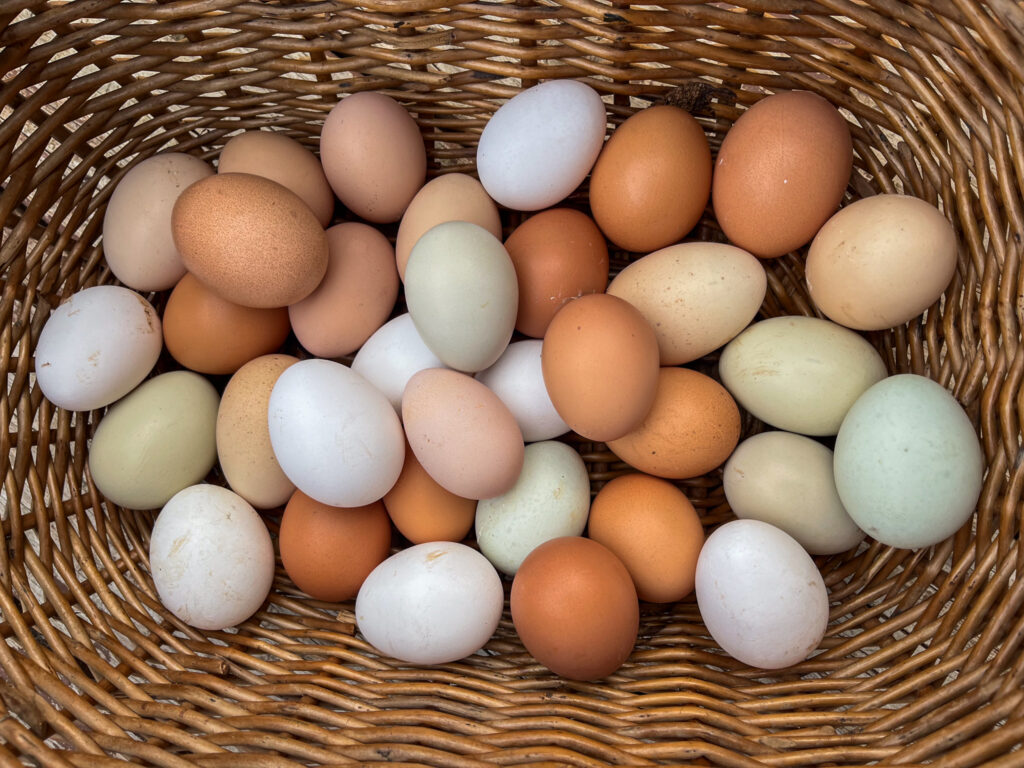
17. Parsley
Feeding parsley to chickens is a great idea because it’s surprisingly high in protein and packed with vitamins and minerals. Parsley contains vitamins A, C, and K, along with iron and calcium, making it a super nutritious addition to their diet.
You can easily add parsley to your chickens’ feed for an extra boost of nutrients. Whether you chop it up fresh or dry it and mix it in, parsley is a simple way to support your chickens’ health and keep them happy.
18. Canola
Feeding canola to chickens can be a good way to boost their protein intake since it can be as high as 36% protein. However, canola isn’t as digestible as other protein sources, so it’s important to use it wisely.
Canola meal is typically added as part of a high-protein feed, rather than being fed on its own. It should be mixed with other ingredients in a complete feed to make sure your chickens get all the nutrients they need.
While canola meal can be beneficial, it’s just one piece of the puzzle when it comes to giving your chickens a balanced diet.
19. Meat
Feeding meat to chickens is a great way to give them a high-protein treat since chickens are omnivores and naturally enjoy eating meat.
Leftover meats from dinner can be a tasty and nutritious snack for your flock, just be sure the meat doesn’t have a lot of salt on it, as too much salt isn’t good for chickens.
Feeding them meat provides a rich source of protein that supports their overall health, helps with feather growth, and can even boost egg production. It’s an easy way to make use of leftovers while keeping your chickens happy and healthy.
20. Alfalfa
Feeding alfalfa to your flock is a great idea because it’s high in protein and makes a fantastic supplement for chickens. Alfalfa is also pretty easy to grow, making it a convenient and natural way to boost your chickens’ diet.
It’s a great protein resource, especially during the winter months when fresh greens might be scarce. Whether you offer it fresh, dried, or in pellet form, alfalfa can help keep your chickens healthy and well-nourished, supporting their growth, egg production, and overall well-being.
21. Sprouts
Feeding sprouted beans to chickens is a great way to give them a nutritious treat, especially since mung beans can be very high in protein. However, it’s important to remember that dried beans should never be fed to chickens because they can be toxic.
To safely sprout beans and lentils, start by soaking them in water for about 12 hours, then drain and rinse them. Keep the beans damp and rinse them a couple of times a day until they start to sprout, which usually takes a few days.
Once sprouted, they’re safe and healthy for your chickens to eat, providing them with a protein-rich snack that’s easy to digest. Sprouted mung beans and lentils are a simple and natural way to boost your chickens’ diet.
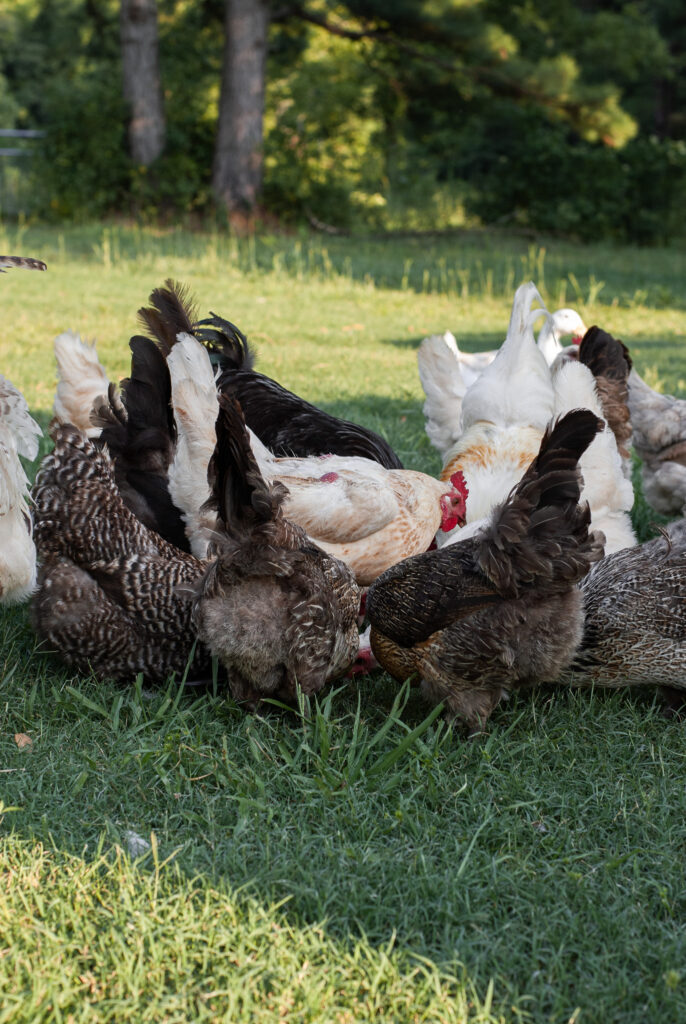
The Best Protein For Chickens FAQs
Can I feed my chickens dairy products like yogurt or cheese?
Yes, chickens can eat small amounts of dairy products like yogurt or cheese, which provide a good protein boost. Just remember to offer these in moderation, as too much dairy can cause digestive issues.
Is peanut meal a good protein source for chickens?
Peanut meal is high in protein and can be a good addition to your chickens’ diet, but it should be used carefully. Some chickens might be allergic to peanuts, and it’s important to make sure the meal is fresh and free from mold.
Can I give my chickens fish scraps as a protein source?
Yes, fish scraps can be a good protein source for chickens, but be cautious. Fish can have high levels of mercury and other contaminants, so it’s best to use fish from safe, reliable sources and not as a main protein source.
Are mealworms or crickets better for chickens?
Both mealworms and crickets are excellent high-protein snacks for chickens. Mealworms are easier to raise and manage, while crickets offer similar nutritional benefits but can be more challenging to farm at home.
Is it okay to feed my chickens cooked beans for protein?
Yes, cooked beans are safe and provide a good source of protein for chickens. Just make sure they are fully cooked, as raw or undercooked beans can be toxic.
Can chickens eat nuts for protein?
Chickens can eat nuts like almonds, walnuts, and peanuts in small quantities. Nuts are high in protein but also high in fat, so they should be given as an occasional treat rather than a staple.
Should I give my chickens protein supplements?
Protein supplements can be helpful, especially during molting or for young chicks, but they should not replace a balanced diet. Use supplements to boost protein intake when needed, but always focus on providing a varied diet.
Can chickens eat raw meat as a protein source?
While chickens can eat raw meat, it’s generally safer to cook it first to reduce the risk of bacterial contamination. Cooked meat is a great protein source and can be fed in moderation as part of their diet.
Are there any plants I can grow specifically for chicken protein?
Yes, you can grow plants like alfalfa, clover, and comfrey, which are high in protein and can be a great supplement to your chickens’ diet. These plants are easy to grow and provide fresh, natural protein throughout the year.
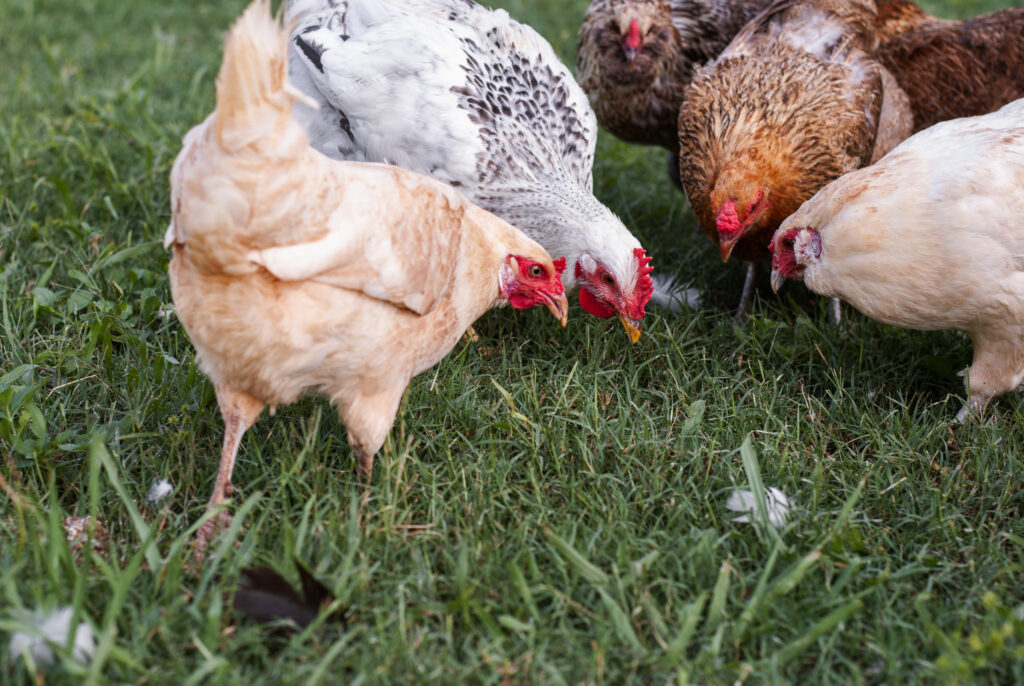
Final Thoughts on the Best Protein for Chickens
When it comes to giving your chickens the best protein, there are plenty of options to choose from. Whether you’re feeding them eggs, mealworms, sunflower seeds, or even kitchen scraps like meat and dairy, it’s all about finding what works best for your flock.
Just remember to mix things up and provide a balanced diet, so your chickens get all the nutrients they need. By offering a variety of protein sources, you’ll help keep your chickens healthy, happy, and laying plenty of eggs.
If you enjoyed this chicken article, please share it!
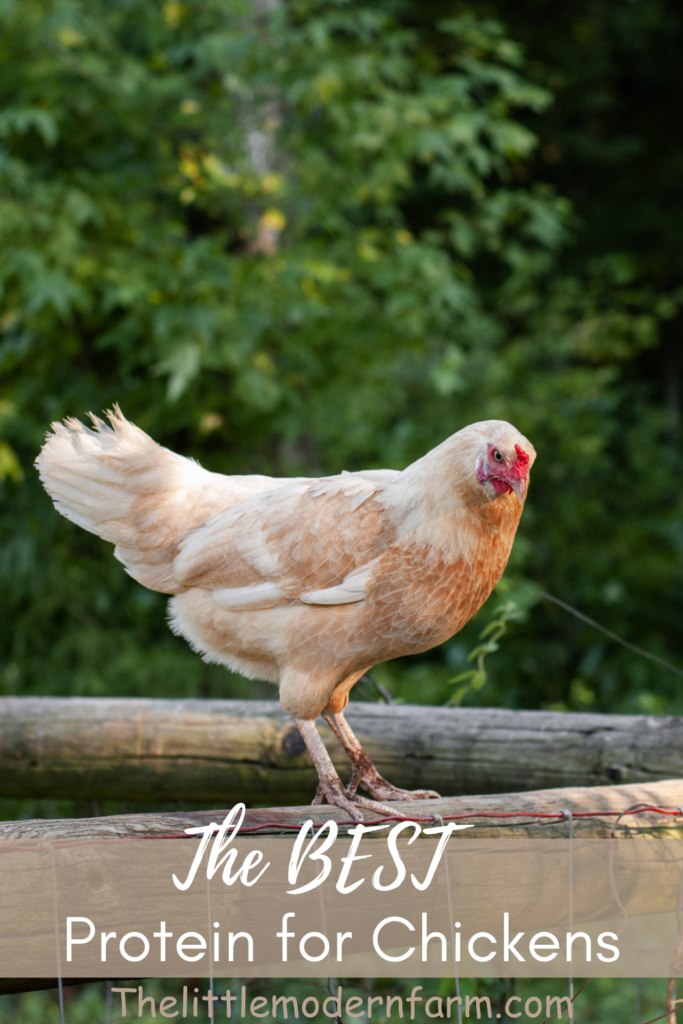
More From The Farm
What is the best type of grit for chickens? Chicken grit might seem like a small thing, but it plays a big role in keeping your chickens healthy.
Grit is basically tiny stones or sand that chickens eat to help them digest their food.Since chickens don’t have teeth, the grit moves into their digestive tract, where it helps grind up food, making it easier to digest.
There are different types of grit, and choosing the right one can make a big difference in how well your chickens process their food and stay healthy….
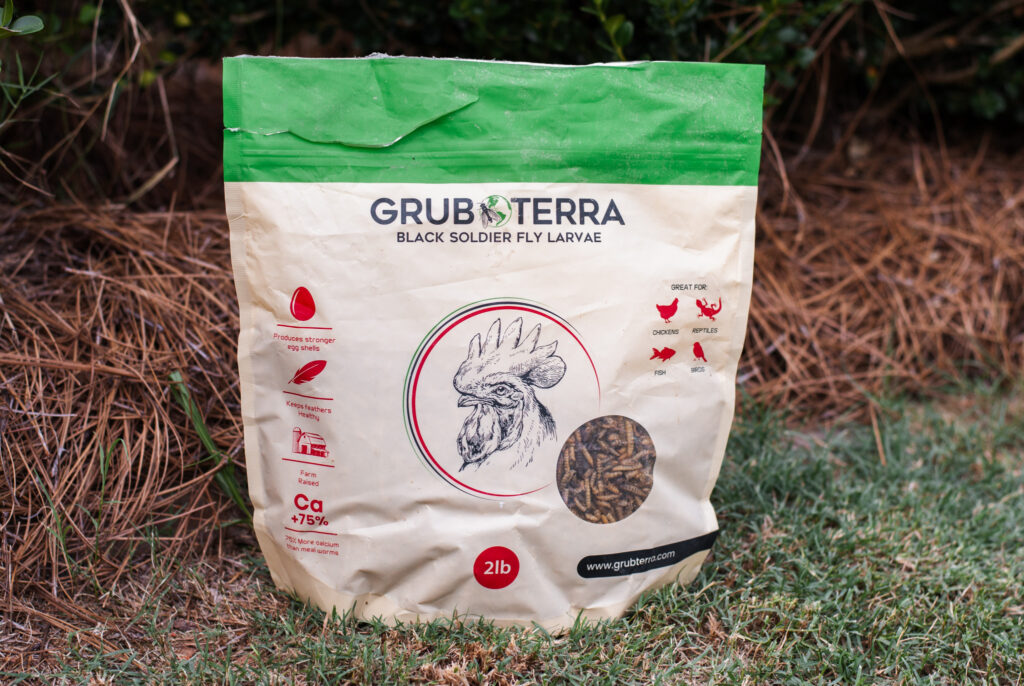
[…] wondered about the best protein for chickens? Chickens need a lot of protein to stay healthy, lay plenty of eggs, and grow strong feathers. […]